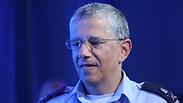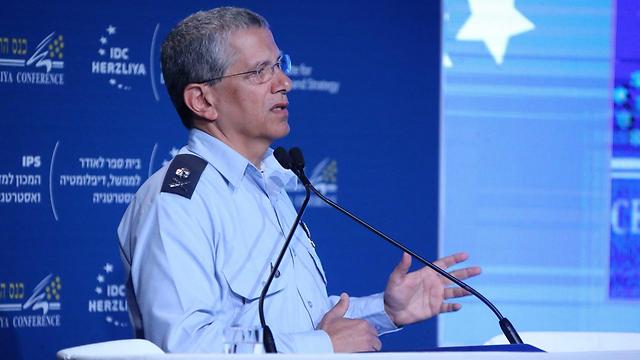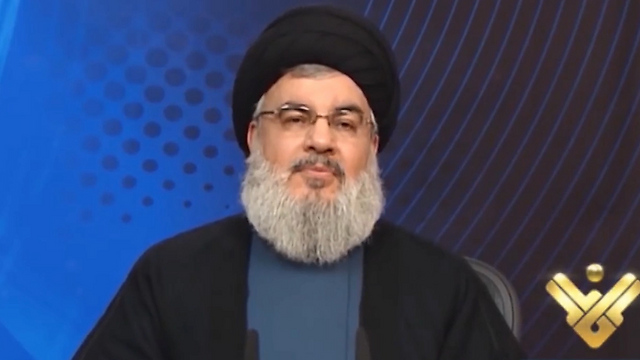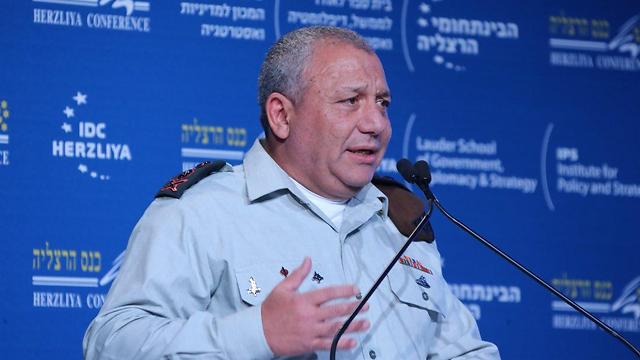

IAF commander: Israel would go 'all-out' if war breaks out again with Hezbollah
At the annual Herzliya security conference, Maj. Gen. Eshel says Israel can carry out same number of strikes it did during the 34 days of the Second Lebanon War—in just two or three days now; IDF chief Eisenkot stresses Israel still sees Hezbollah as its main threat and will keep thwarting its attempts to obtain advanced arms.
Israel's Air Force commander sent a warning to Hezbollah on Wednesday, saying the IDF's capabilities have been upgraded since the 2006 Second Lebanon War, allowing it to carry out the same number of bombings it mounted in the 34 days of war in just 48 hours.
"If war breaks out in the north, we have to open with all our strength from the start," Maj. Gen. Amir Eshel said at the annual Herzliya security conference, pointing to the likelihood of international pressure for a quick ceasefire before Israel can achieve all its strategic goals.
Israeli politicians and generals have spoken often of an intention to hit hard in Lebanon if war breaks out, in an apparent bid to deter Hezbollah. Eshel said in 2014 that another conflict could see Israeli attacks 15 times more devastating for Lebanon than in 2006.
But at the conference, Eshel noted that "many elements busy achieving their goals" in Syria's civil war were interested in preventing any fresh hostilities in Lebanon, where Israel says Hezbollah has built up an arsenal of more than 100,000 rockets.
Since early in the six-year-old Syria war, Hezbollah's energies have been focused on propping up President Bashar Assad in alliance with Iran and Russia, throwing thousands of its fighters into battle against Syrian rebels.
But the Shi'ite group has not altered its view of Israel as its foremost enemy, and Israel's military has said it regards Hezbollah in the same way.
Although Israel has kept to the sidelines of the war in Syria, Israeli aircraft have targeted suspected Iranian arms shipments to Hezbollah, operations complicated by Russian and US air activity in the region.
"The skies of the Middle East are a lot more crowded than before, with lots of players," Eshel said, pointing to the need for the air force to operate "surgically" to avoid "mistakes."
On the other hand, such strikes, he said, also act as a deterrent to Hezbollah, whose missile capabilities could mean that the air force and the rest of the Israeli military will fight any future Lebanon war with their own bases under attack.
Eshel cautioned residents in southern Lebanon, a Hezbollah stronghold, to leave their homes if a new conflict erupts, saying the Iranian-backed group uses civilian homes as "launching bases for missiles and rockets."
About 1,200 Lebanese, mostly civilians, and 160 Israelis, most of them troops fighting Hezbollah, were killed in the 2006 war, which displaced a million people in Lebanon and up to 500,000 in Israel.
Hezbollah expanding warfare capabilities
IDF Chief of Staff Lt. Gen. Gadi Eisenkot, who spoke at the conference on Tuesday, said the Lebanon-based terror group remains the main threat to the State of Israel.
"Hezbollah is expanding its warfare capabilities, it is grossly violating (UN Security Council) Resolution 1701, and if we look at southern Lebanon, we see this organization deployed in 200 villages and towns," he said.
"There are tens of thousands of rockets there. We have a clear interest in preventing the transfer of advanced weapons over to Hezbollah. As was reported, there were actions made to prevent the transfer of advanced weaponry aimed at harming Israel, as was the case in recent years, and as will be the case in the future."
While reiterating that Israel has no wish to interfere in the civil war in Syria, Eisenkot noted it still provides humanitarian aid to the war-torn country and its refugees, explaining that doing so is "our duty as Israelis and as Jews."
The chief of staff also spoke about Iran's influence on the region. "We see the efforts of Iran in Lebanon, but not only there," he said, noting this influence is prominently felt in places like Syria and the Gaza Strip.
"Iran perceives itself as a regional power," Eisenkot explained, and in thinking so, it acts as one, giving Hezbollah "more than $800 million a year" to advance its cause.
The IDF chief stressed that "stopping the development of Iran's military industry is a security objective for the entire region," and not just for Israel.
"The global effort should be that Iran is not the next North Korea," he said. "Two days ago, there was a shooting from Iran to targets in Syria. It was meant to make a point."


















